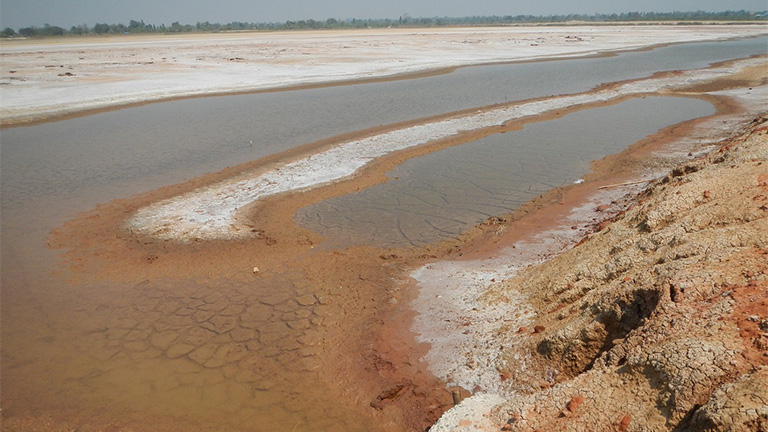The Mitsui & Co. Environment Fund
Introduction to Grant Projects
Ehime University, The Graduate School of Agriculture Associate Professor: Takashi Kume
Practical research of adaptive environmental governance to convert high levels of salinity concentration into a resource material by introducing agricultural salt cascade-type system
Research grant
- Project Description
A rural village in Khon Kaen province, the Kingdom of Thailand, is facing problems from unstable income because of salinization of agricultural soil caused by excessive logging. This project will introduce and propose system which utilizes cascade-type agricultural land salts to the area. Rain water continues to increase the salinity concentration whilst displacing the earth's surface, ground water, and evaporation ponds. This system will use the salts efficiently, carrying out the manufacture of common salt, production of crops with salinity tolerance, and others, in accordance with each stage. This initiative is aiming to achieve three points: improvement of soil salinization, stability of farmer income by combining occupations, and to demonstrate accommodative environmental business which further utilizes salt as a new resource. [No. R17-0039]
- Fields
- Global Environment
- Grant year
- FY2017 Research Grants
- Grant term
- Three years (From April 2018 to March 2021)
- Grant amount
- 13.651 million yen
- Activity region
- Ban Phai district of Khon Kaen province, the Kingdom of Thailand

Overview of the Organization

- Project organization
- Ehime University
The Graduate School of Agriculture - Representative
- Associate Professor: Takashi Kume
- Profile
- Specialist field: Soil Environment Hydrology
Affiliated academic societies: The Japanese Society of Irrigation, Drainage and Rural Engineering
Background: After acquiring a doctorate degree from Kyoto University, took a position as a senior researcher on a project at the Research Institute for Humanity and Nature. Following this, became a project researcher at the Aris Land Research Center at Tottori University and associate professor at the Research Institute for Humanity and Nature, before taking up current role. - Research record
-
- Until this project, was carrying out research related to soil salinization and agricultural water control in mainly arid regions of irrigated farmland. Areas targeted include Inner Mongolia Autonomous Region of China, Adana Province of the Republic of Turkey, Tamil Nadu state in India, among others.
- The research outline is analysis of salt origination from environmental traceability methods using stable isotope analysis and elucidation of salt and moisture movement mechanisms in various irrigated farmland. This series of research revealed in more detail that the implementation of salinity and water management on irrigated farmland can take place by considering the origin of the salt in addition to the salinity balance.
- Based on these results, this research will aim to improve the income of farmers by advancing salt management one step further through controlling salt emission and introducing a cascade-type system which can be used in agriculture according to levels of salinity concentration.
- WEB site
- https://www.ehime-u.ac.jp/